London Met: Deportation's Effect on Children and Family
VerifiedAdded on 2021/08/03
|23
|10724
|96
Essay
AI Summary
This essay examines the multifaceted effects of deportation on children and families, particularly within the context of UK immigration law. It explores the legal frameworks, including Article 8 of the ECHR, that govern deportation decisions and their impact on family life. The study investigates the consequences of family separation for both deportees and those left behind, highlighting the vulnerability of children in these situations. The research considers the complexities of deportation, examining the legal implications of enforcing Article 8, the Windrush Generation, and analyzing various cases to compare deportation impacts. The essay also delves into the rationale behind deportation policies, including the UK Borders Act 2007 and the evolving rules regarding foreign criminals and asylum seekers. The study aims to evaluate the effects of deportation on children and families, emphasizing the importance of considering children's rights and the need for solutions that prioritize family reunification and child welfare.
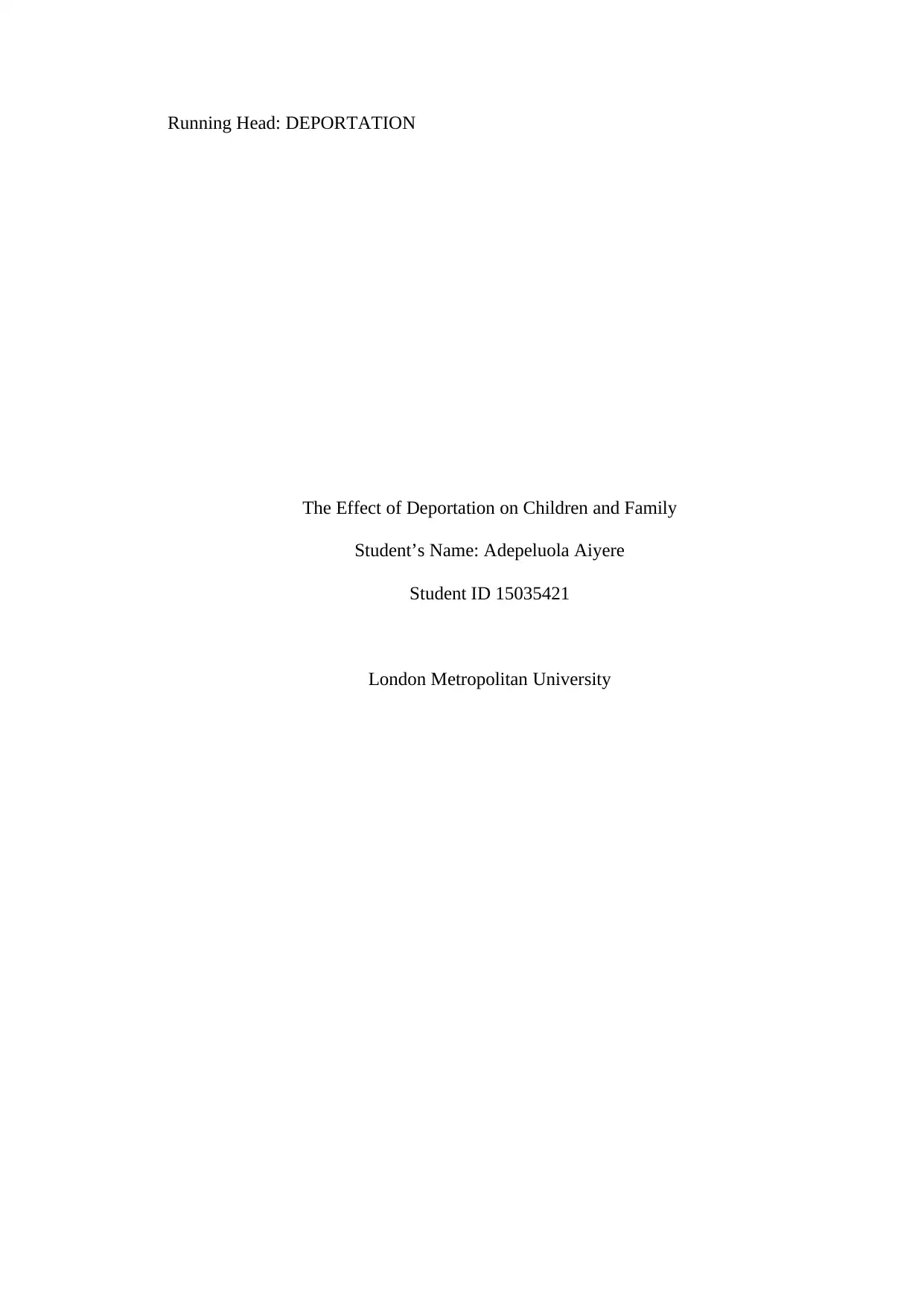
Running Head: DEPORTATION
The Effect of Deportation on Children and Family
Student’s Name: Adepeluola Aiyere
Student ID 15035421
London Metropolitan University
The Effect of Deportation on Children and Family
Student’s Name: Adepeluola Aiyere
Student ID 15035421
London Metropolitan University
Paraphrase This Document
Need a fresh take? Get an instant paraphrase of this document with our AI Paraphraser

Deportation 2
TABLE OF CONTENTS
TABLE OF CONTENTS
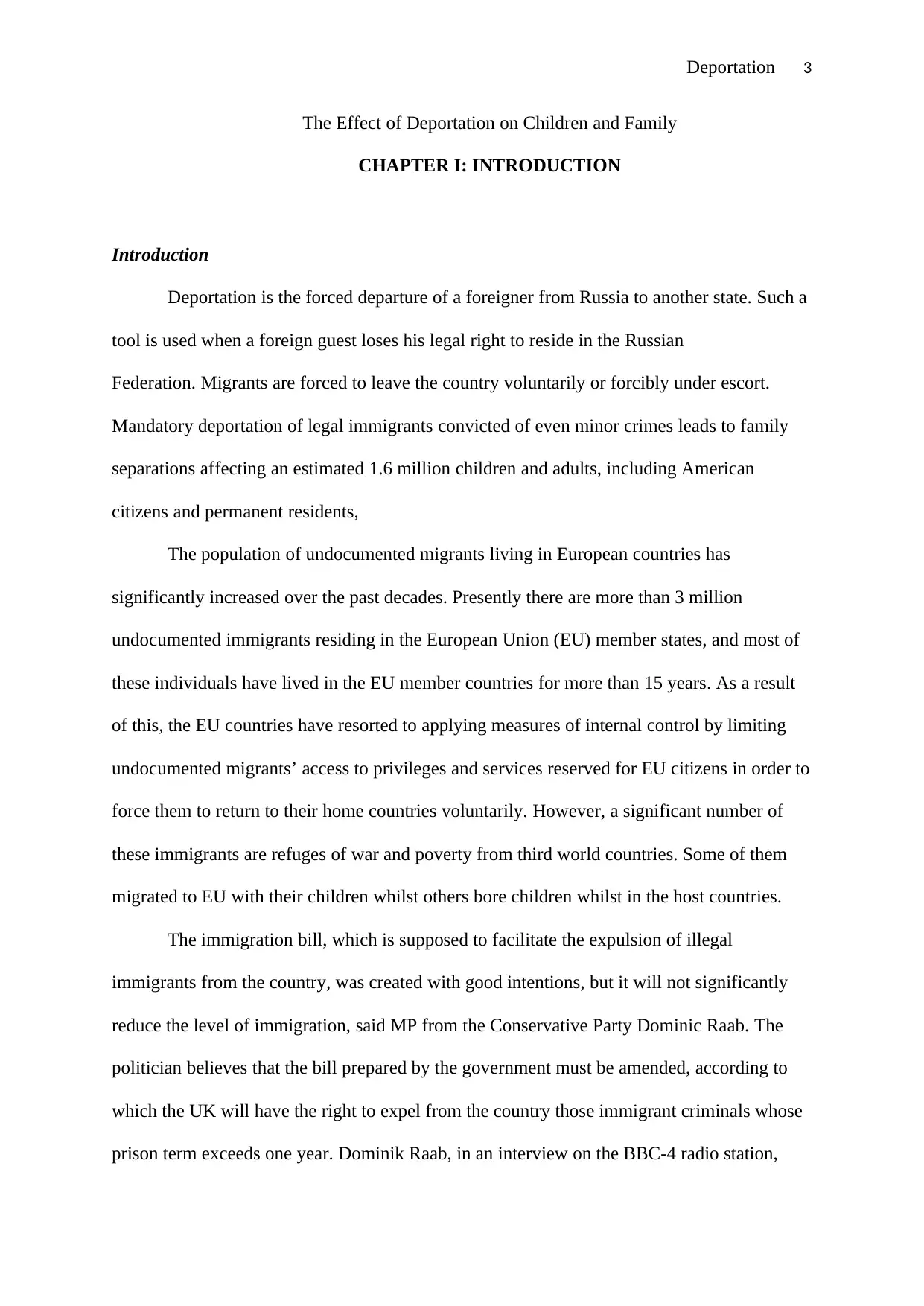
Deportation 3
The Effect of Deportation on Children and Family
CHAPTER I: INTRODUCTION
Introduction
Deportation is the forced departure of a foreigner from Russia to another state. Such a
tool is used when a foreign guest loses his legal right to reside in the Russian
Federation. Migrants are forced to leave the country voluntarily or forcibly under escort.
Mandatory deportation of legal immigrants convicted of even minor crimes leads to family
separations affecting an estimated 1.6 million children and adults, including American
citizens and permanent residents,
The population of undocumented migrants living in European countries has
significantly increased over the past decades. Presently there are more than 3 million
undocumented immigrants residing in the European Union (EU) member states, and most of
these individuals have lived in the EU member countries for more than 15 years. As a result
of this, the EU countries have resorted to applying measures of internal control by limiting
undocumented migrants’ access to privileges and services reserved for EU citizens in order to
force them to return to their home countries voluntarily. However, a significant number of
these immigrants are refuges of war and poverty from third world countries. Some of them
migrated to EU with their children whilst others bore children whilst in the host countries.
The immigration bill, which is supposed to facilitate the expulsion of illegal
immigrants from the country, was created with good intentions, but it will not significantly
reduce the level of immigration, said MP from the Conservative Party Dominic Raab. The
politician believes that the bill prepared by the government must be amended, according to
which the UK will have the right to expel from the country those immigrant criminals whose
prison term exceeds one year. Dominik Raab, in an interview on the BBC-4 radio station,
The Effect of Deportation on Children and Family
CHAPTER I: INTRODUCTION
Introduction
Deportation is the forced departure of a foreigner from Russia to another state. Such a
tool is used when a foreign guest loses his legal right to reside in the Russian
Federation. Migrants are forced to leave the country voluntarily or forcibly under escort.
Mandatory deportation of legal immigrants convicted of even minor crimes leads to family
separations affecting an estimated 1.6 million children and adults, including American
citizens and permanent residents,
The population of undocumented migrants living in European countries has
significantly increased over the past decades. Presently there are more than 3 million
undocumented immigrants residing in the European Union (EU) member states, and most of
these individuals have lived in the EU member countries for more than 15 years. As a result
of this, the EU countries have resorted to applying measures of internal control by limiting
undocumented migrants’ access to privileges and services reserved for EU citizens in order to
force them to return to their home countries voluntarily. However, a significant number of
these immigrants are refuges of war and poverty from third world countries. Some of them
migrated to EU with their children whilst others bore children whilst in the host countries.
The immigration bill, which is supposed to facilitate the expulsion of illegal
immigrants from the country, was created with good intentions, but it will not significantly
reduce the level of immigration, said MP from the Conservative Party Dominic Raab. The
politician believes that the bill prepared by the government must be amended, according to
which the UK will have the right to expel from the country those immigrant criminals whose
prison term exceeds one year. Dominik Raab, in an interview on the BBC-4 radio station,
⊘ This is a preview!⊘
Do you want full access?
Subscribe today to unlock all pages.

Trusted by 1+ million students worldwide
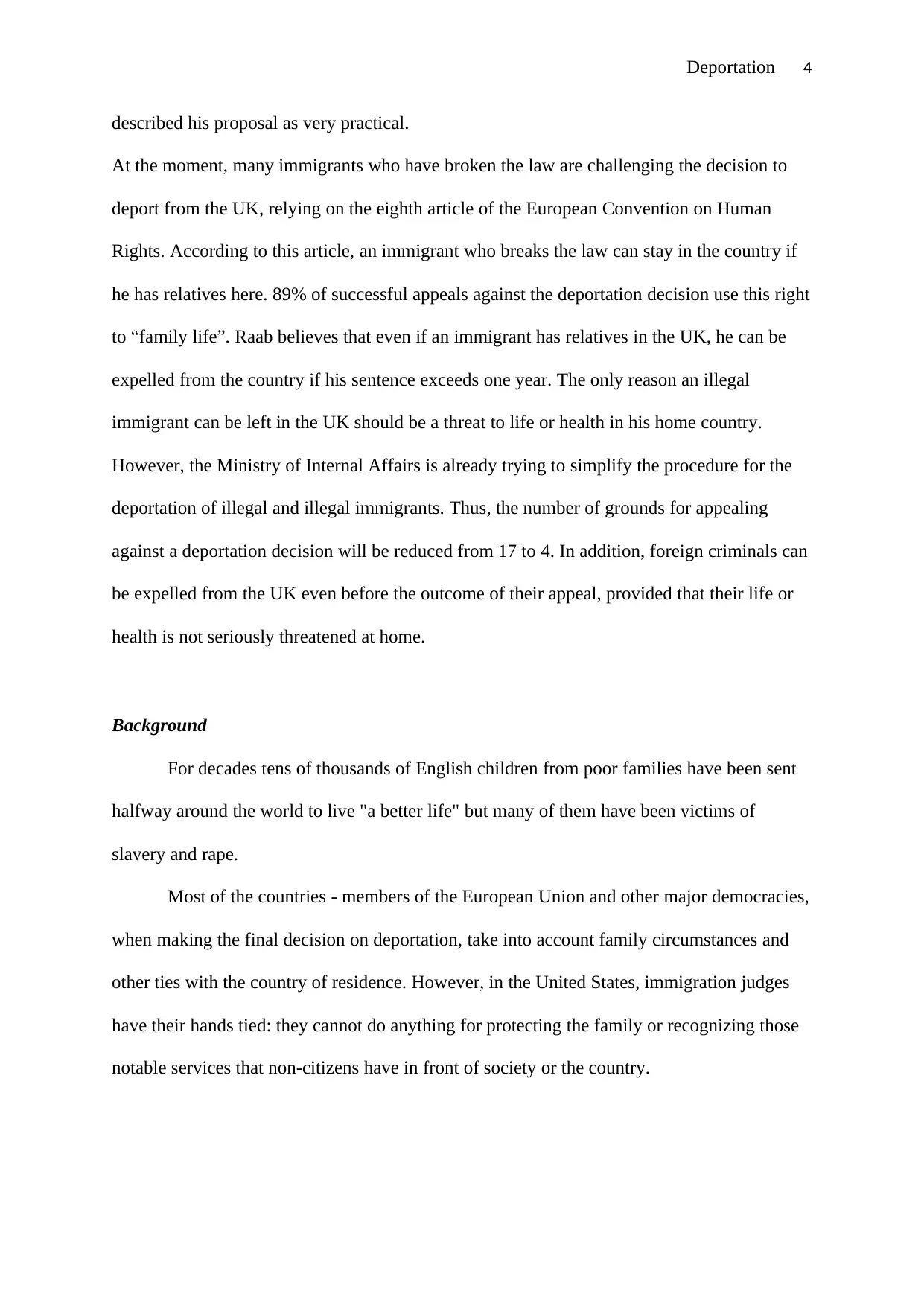
Deportation 4
described his proposal as very practical.
At the moment, many immigrants who have broken the law are challenging the decision to
deport from the UK, relying on the eighth article of the European Convention on Human
Rights. According to this article, an immigrant who breaks the law can stay in the country if
he has relatives here. 89% of successful appeals against the deportation decision use this right
to “family life”. Raab believes that even if an immigrant has relatives in the UK, he can be
expelled from the country if his sentence exceeds one year. The only reason an illegal
immigrant can be left in the UK should be a threat to life or health in his home country.
However, the Ministry of Internal Affairs is already trying to simplify the procedure for the
deportation of illegal and illegal immigrants. Thus, the number of grounds for appealing
against a deportation decision will be reduced from 17 to 4. In addition, foreign criminals can
be expelled from the UK even before the outcome of their appeal, provided that their life or
health is not seriously threatened at home.
Background
For decades tens of thousands of English children from poor families have been sent
halfway around the world to live "a better life" but many of them have been victims of
slavery and rape.
Most of the countries - members of the European Union and other major democracies,
when making the final decision on deportation, take into account family circumstances and
other ties with the country of residence. However, in the United States, immigration judges
have their hands tied: they cannot do anything for protecting the family or recognizing those
notable services that non-citizens have in front of society or the country.
described his proposal as very practical.
At the moment, many immigrants who have broken the law are challenging the decision to
deport from the UK, relying on the eighth article of the European Convention on Human
Rights. According to this article, an immigrant who breaks the law can stay in the country if
he has relatives here. 89% of successful appeals against the deportation decision use this right
to “family life”. Raab believes that even if an immigrant has relatives in the UK, he can be
expelled from the country if his sentence exceeds one year. The only reason an illegal
immigrant can be left in the UK should be a threat to life or health in his home country.
However, the Ministry of Internal Affairs is already trying to simplify the procedure for the
deportation of illegal and illegal immigrants. Thus, the number of grounds for appealing
against a deportation decision will be reduced from 17 to 4. In addition, foreign criminals can
be expelled from the UK even before the outcome of their appeal, provided that their life or
health is not seriously threatened at home.
Background
For decades tens of thousands of English children from poor families have been sent
halfway around the world to live "a better life" but many of them have been victims of
slavery and rape.
Most of the countries - members of the European Union and other major democracies,
when making the final decision on deportation, take into account family circumstances and
other ties with the country of residence. However, in the United States, immigration judges
have their hands tied: they cannot do anything for protecting the family or recognizing those
notable services that non-citizens have in front of society or the country.
Paraphrase This Document
Need a fresh take? Get an instant paraphrase of this document with our AI Paraphraser
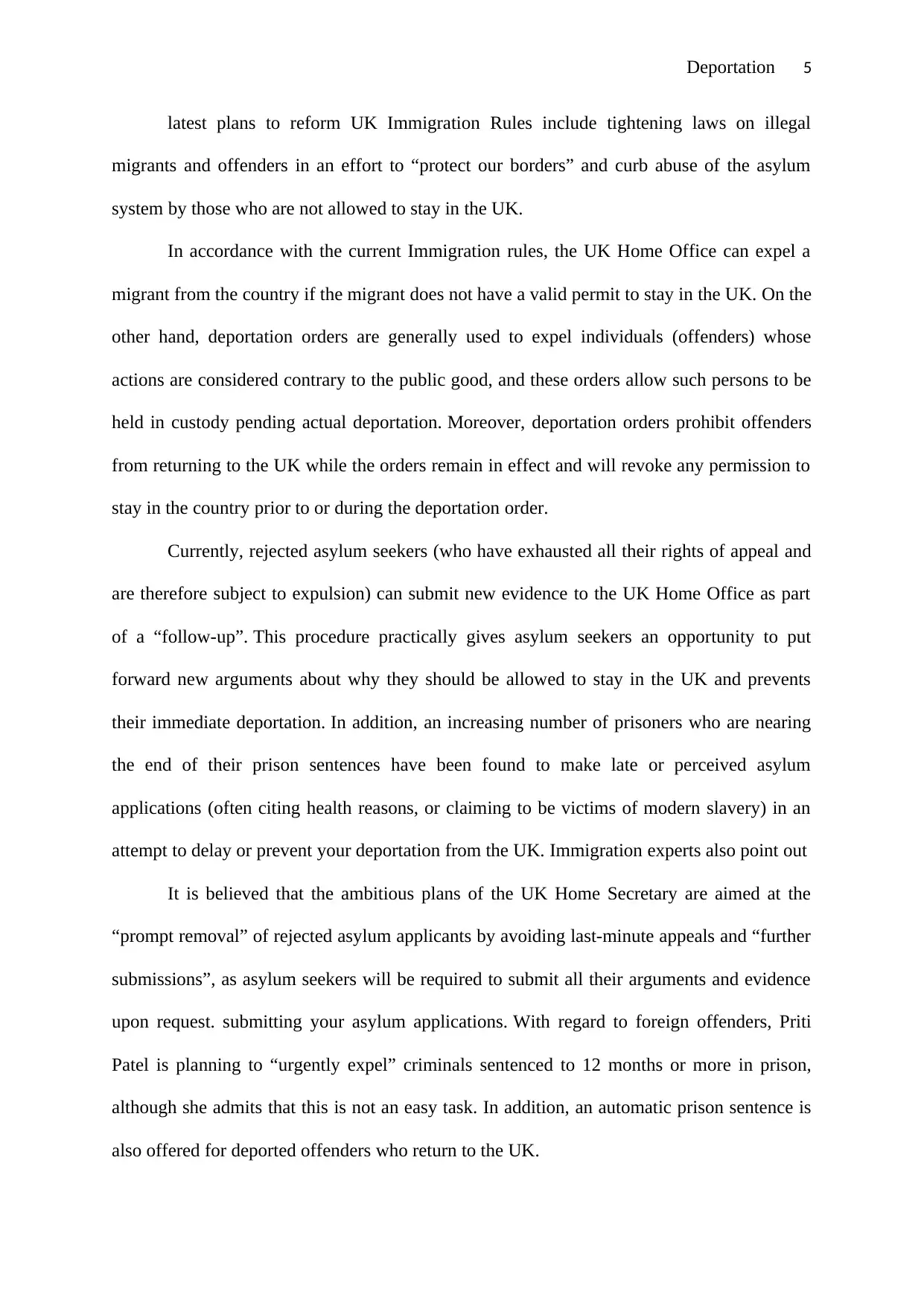
Deportation 5
latest plans to reform UK Immigration Rules include tightening laws on illegal
migrants and offenders in an effort to “protect our borders” and curb abuse of the asylum
system by those who are not allowed to stay in the UK.
In accordance with the current Immigration rules, the UK Home Office can expel a
migrant from the country if the migrant does not have a valid permit to stay in the UK. On the
other hand, deportation orders are generally used to expel individuals (offenders) whose
actions are considered contrary to the public good, and these orders allow such persons to be
held in custody pending actual deportation. Moreover, deportation orders prohibit offenders
from returning to the UK while the orders remain in effect and will revoke any permission to
stay in the country prior to or during the deportation order.
Currently, rejected asylum seekers (who have exhausted all their rights of appeal and
are therefore subject to expulsion) can submit new evidence to the UK Home Office as part
of a “follow-up”. This procedure practically gives asylum seekers an opportunity to put
forward new arguments about why they should be allowed to stay in the UK and prevents
their immediate deportation. In addition, an increasing number of prisoners who are nearing
the end of their prison sentences have been found to make late or perceived asylum
applications (often citing health reasons, or claiming to be victims of modern slavery) in an
attempt to delay or prevent your deportation from the UK. Immigration experts also point out
It is believed that the ambitious plans of the UK Home Secretary are aimed at the
“prompt removal” of rejected asylum applicants by avoiding last-minute appeals and “further
submissions”, as asylum seekers will be required to submit all their arguments and evidence
upon request. submitting your asylum applications. With regard to foreign offenders, Priti
Patel is planning to “urgently expel” criminals sentenced to 12 months or more in prison,
although she admits that this is not an easy task. In addition, an automatic prison sentence is
also offered for deported offenders who return to the UK.
latest plans to reform UK Immigration Rules include tightening laws on illegal
migrants and offenders in an effort to “protect our borders” and curb abuse of the asylum
system by those who are not allowed to stay in the UK.
In accordance with the current Immigration rules, the UK Home Office can expel a
migrant from the country if the migrant does not have a valid permit to stay in the UK. On the
other hand, deportation orders are generally used to expel individuals (offenders) whose
actions are considered contrary to the public good, and these orders allow such persons to be
held in custody pending actual deportation. Moreover, deportation orders prohibit offenders
from returning to the UK while the orders remain in effect and will revoke any permission to
stay in the country prior to or during the deportation order.
Currently, rejected asylum seekers (who have exhausted all their rights of appeal and
are therefore subject to expulsion) can submit new evidence to the UK Home Office as part
of a “follow-up”. This procedure practically gives asylum seekers an opportunity to put
forward new arguments about why they should be allowed to stay in the UK and prevents
their immediate deportation. In addition, an increasing number of prisoners who are nearing
the end of their prison sentences have been found to make late or perceived asylum
applications (often citing health reasons, or claiming to be victims of modern slavery) in an
attempt to delay or prevent your deportation from the UK. Immigration experts also point out
It is believed that the ambitious plans of the UK Home Secretary are aimed at the
“prompt removal” of rejected asylum applicants by avoiding last-minute appeals and “further
submissions”, as asylum seekers will be required to submit all their arguments and evidence
upon request. submitting your asylum applications. With regard to foreign offenders, Priti
Patel is planning to “urgently expel” criminals sentenced to 12 months or more in prison,
although she admits that this is not an easy task. In addition, an automatic prison sentence is
also offered for deported offenders who return to the UK.
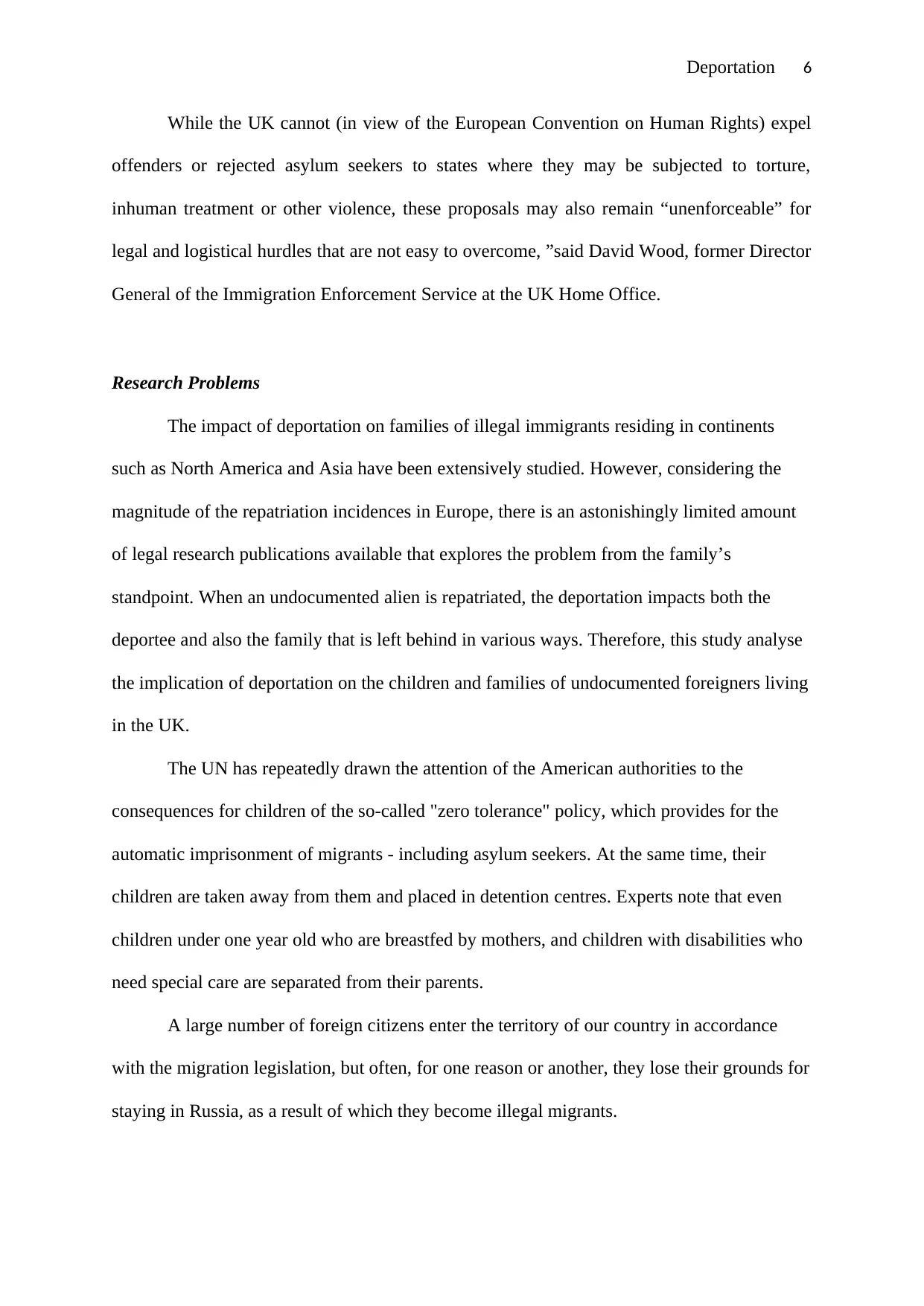
Deportation 6
While the UK cannot (in view of the European Convention on Human Rights) expel
offenders or rejected asylum seekers to states where they may be subjected to torture,
inhuman treatment or other violence, these proposals may also remain “unenforceable” for
legal and logistical hurdles that are not easy to overcome, ”said David Wood, former Director
General of the Immigration Enforcement Service at the UK Home Office.
Research Problems
The impact of deportation on families of illegal immigrants residing in continents
such as North America and Asia have been extensively studied. However, considering the
magnitude of the repatriation incidences in Europe, there is an astonishingly limited amount
of legal research publications available that explores the problem from the family’s
standpoint. When an undocumented alien is repatriated, the deportation impacts both the
deportee and also the family that is left behind in various ways. Therefore, this study analyse
the implication of deportation on the children and families of undocumented foreigners living
in the UK.
The UN has repeatedly drawn the attention of the American authorities to the
consequences for children of the so-called "zero tolerance" policy, which provides for the
automatic imprisonment of migrants - including asylum seekers. At the same time, their
children are taken away from them and placed in detention centres. Experts note that even
children under one year old who are breastfed by mothers, and children with disabilities who
need special care are separated from their parents.
A large number of foreign citizens enter the territory of our country in accordance
with the migration legislation, but often, for one reason or another, they lose their grounds for
staying in Russia, as a result of which they become illegal migrants.
While the UK cannot (in view of the European Convention on Human Rights) expel
offenders or rejected asylum seekers to states where they may be subjected to torture,
inhuman treatment or other violence, these proposals may also remain “unenforceable” for
legal and logistical hurdles that are not easy to overcome, ”said David Wood, former Director
General of the Immigration Enforcement Service at the UK Home Office.
Research Problems
The impact of deportation on families of illegal immigrants residing in continents
such as North America and Asia have been extensively studied. However, considering the
magnitude of the repatriation incidences in Europe, there is an astonishingly limited amount
of legal research publications available that explores the problem from the family’s
standpoint. When an undocumented alien is repatriated, the deportation impacts both the
deportee and also the family that is left behind in various ways. Therefore, this study analyse
the implication of deportation on the children and families of undocumented foreigners living
in the UK.
The UN has repeatedly drawn the attention of the American authorities to the
consequences for children of the so-called "zero tolerance" policy, which provides for the
automatic imprisonment of migrants - including asylum seekers. At the same time, their
children are taken away from them and placed in detention centres. Experts note that even
children under one year old who are breastfed by mothers, and children with disabilities who
need special care are separated from their parents.
A large number of foreign citizens enter the territory of our country in accordance
with the migration legislation, but often, for one reason or another, they lose their grounds for
staying in Russia, as a result of which they become illegal migrants.
⊘ This is a preview!⊘
Do you want full access?
Subscribe today to unlock all pages.

Trusted by 1+ million students worldwide
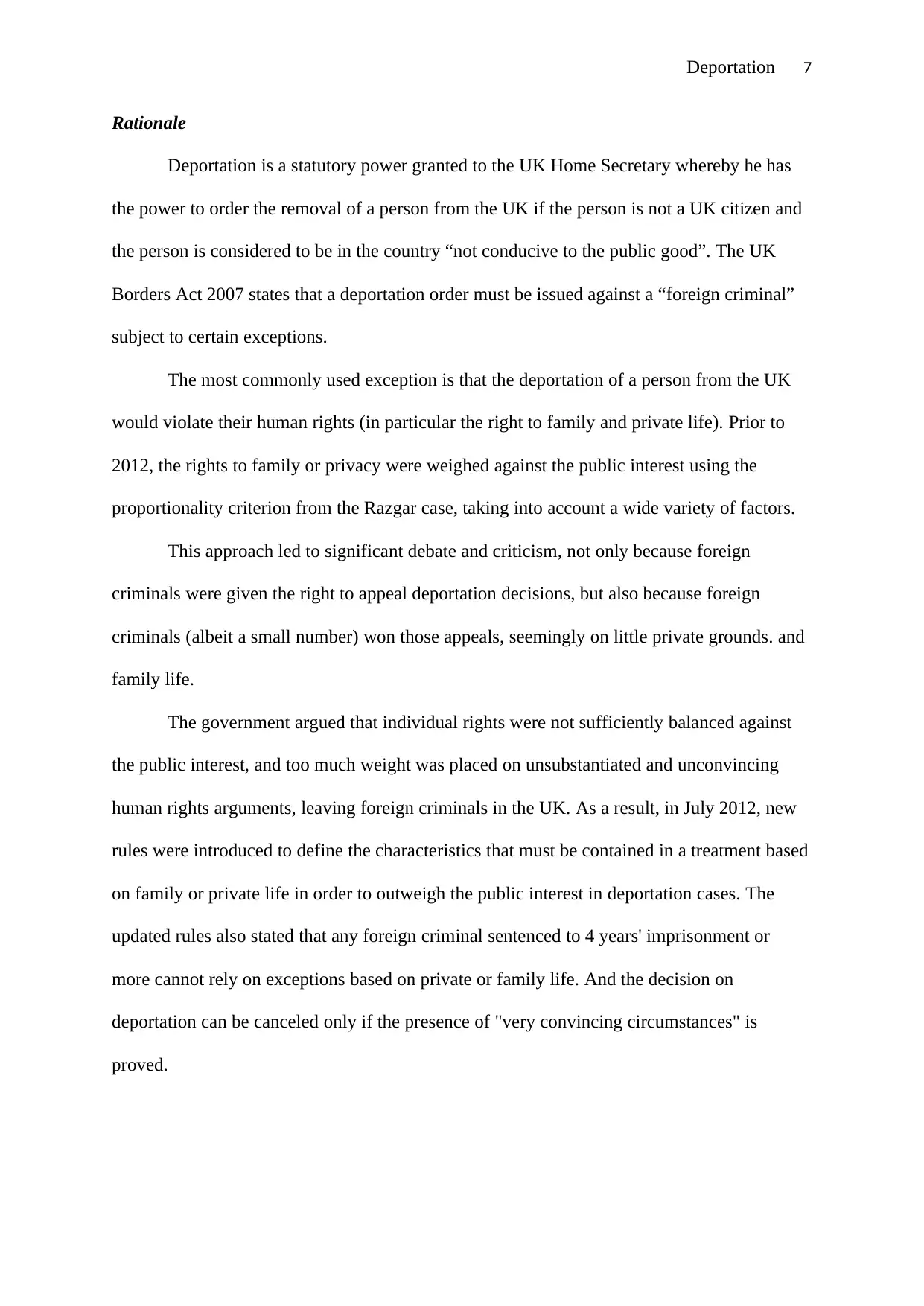
Deportation 7
Rationale
Deportation is a statutory power granted to the UK Home Secretary whereby he has
the power to order the removal of a person from the UK if the person is not a UK citizen and
the person is considered to be in the country “not conducive to the public good”. The UK
Borders Act 2007 states that a deportation order must be issued against a “foreign criminal”
subject to certain exceptions.
The most commonly used exception is that the deportation of a person from the UK
would violate their human rights (in particular the right to family and private life). Prior to
2012, the rights to family or privacy were weighed against the public interest using the
proportionality criterion from the Razgar case, taking into account a wide variety of factors.
This approach led to significant debate and criticism, not only because foreign
criminals were given the right to appeal deportation decisions, but also because foreign
criminals (albeit a small number) won those appeals, seemingly on little private grounds. and
family life.
The government argued that individual rights were not sufficiently balanced against
the public interest, and too much weight was placed on unsubstantiated and unconvincing
human rights arguments, leaving foreign criminals in the UK. As a result, in July 2012, new
rules were introduced to define the characteristics that must be contained in a treatment based
on family or private life in order to outweigh the public interest in deportation cases. The
updated rules also stated that any foreign criminal sentenced to 4 years' imprisonment or
more cannot rely on exceptions based on private or family life. And the decision on
deportation can be canceled only if the presence of "very convincing circumstances" is
proved.
Rationale
Deportation is a statutory power granted to the UK Home Secretary whereby he has
the power to order the removal of a person from the UK if the person is not a UK citizen and
the person is considered to be in the country “not conducive to the public good”. The UK
Borders Act 2007 states that a deportation order must be issued against a “foreign criminal”
subject to certain exceptions.
The most commonly used exception is that the deportation of a person from the UK
would violate their human rights (in particular the right to family and private life). Prior to
2012, the rights to family or privacy were weighed against the public interest using the
proportionality criterion from the Razgar case, taking into account a wide variety of factors.
This approach led to significant debate and criticism, not only because foreign
criminals were given the right to appeal deportation decisions, but also because foreign
criminals (albeit a small number) won those appeals, seemingly on little private grounds. and
family life.
The government argued that individual rights were not sufficiently balanced against
the public interest, and too much weight was placed on unsubstantiated and unconvincing
human rights arguments, leaving foreign criminals in the UK. As a result, in July 2012, new
rules were introduced to define the characteristics that must be contained in a treatment based
on family or private life in order to outweigh the public interest in deportation cases. The
updated rules also stated that any foreign criminal sentenced to 4 years' imprisonment or
more cannot rely on exceptions based on private or family life. And the decision on
deportation can be canceled only if the presence of "very convincing circumstances" is
proved.
Paraphrase This Document
Need a fresh take? Get an instant paraphrase of this document with our AI Paraphraser
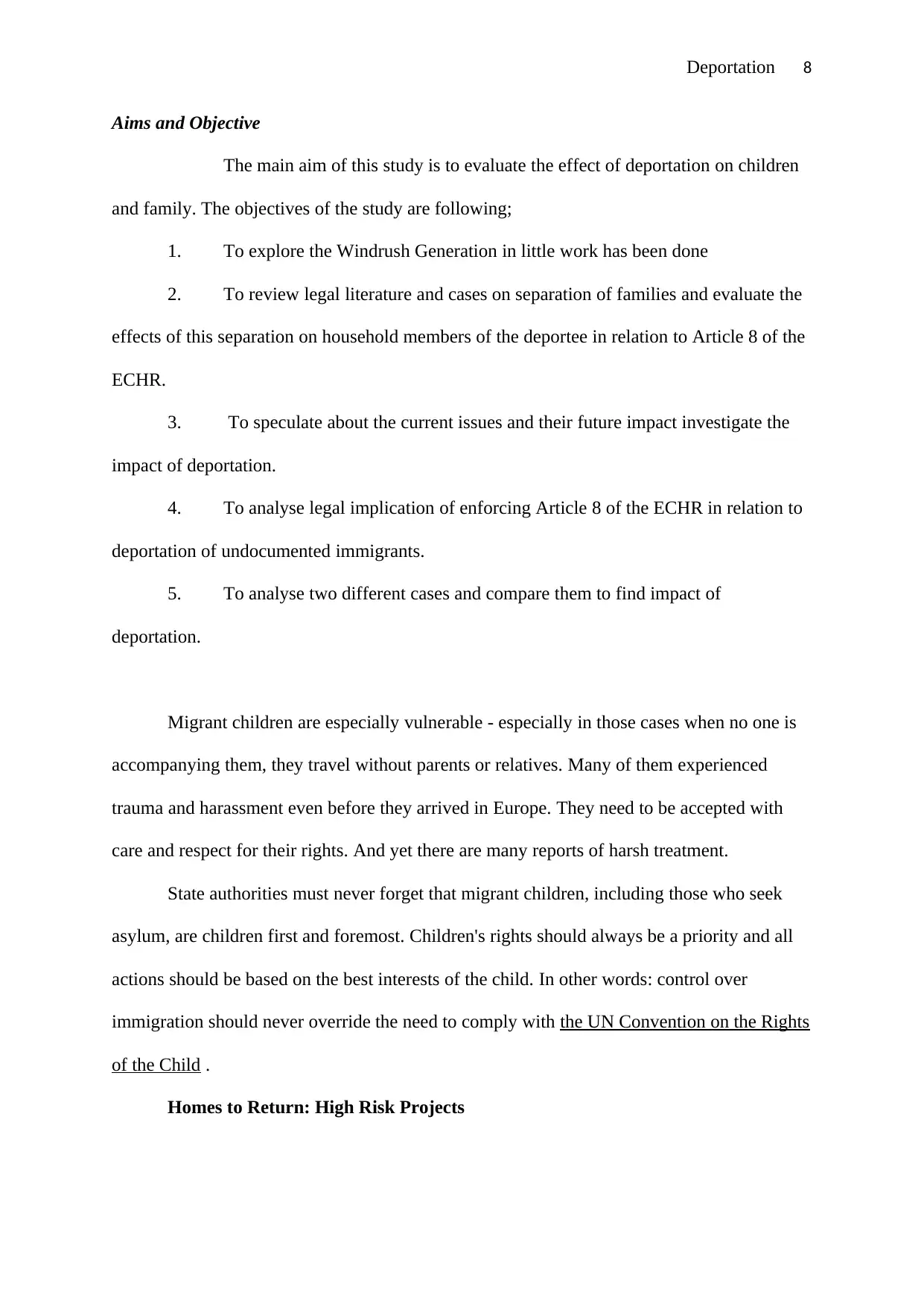
Deportation 8
Aims and Objective
The main aim of this study is to evaluate the effect of deportation on children
and family. The objectives of the study are following;
1. To explore the Windrush Generation in little work has been done
2. To review legal literature and cases on separation of families and evaluate the
effects of this separation on household members of the deportee in relation to Article 8 of the
ECHR.
3. To speculate about the current issues and their future impact investigate the
impact of deportation.
4. To analyse legal implication of enforcing Article 8 of the ECHR in relation to
deportation of undocumented immigrants.
5. To analyse two different cases and compare them to find impact of
deportation.
Migrant children are especially vulnerable - especially in those cases when no one is
accompanying them, they travel without parents or relatives. Many of them experienced
trauma and harassment even before they arrived in Europe. They need to be accepted with
care and respect for their rights. And yet there are many reports of harsh treatment.
State authorities must never forget that migrant children, including those who seek
asylum, are children first and foremost. Children's rights should always be a priority and all
actions should be based on the best interests of the child. In other words: control over
immigration should never override the need to comply with the UN Convention on the Rights
of the Child .
Homes to Return: High Risk Projects
Aims and Objective
The main aim of this study is to evaluate the effect of deportation on children
and family. The objectives of the study are following;
1. To explore the Windrush Generation in little work has been done
2. To review legal literature and cases on separation of families and evaluate the
effects of this separation on household members of the deportee in relation to Article 8 of the
ECHR.
3. To speculate about the current issues and their future impact investigate the
impact of deportation.
4. To analyse legal implication of enforcing Article 8 of the ECHR in relation to
deportation of undocumented immigrants.
5. To analyse two different cases and compare them to find impact of
deportation.
Migrant children are especially vulnerable - especially in those cases when no one is
accompanying them, they travel without parents or relatives. Many of them experienced
trauma and harassment even before they arrived in Europe. They need to be accepted with
care and respect for their rights. And yet there are many reports of harsh treatment.
State authorities must never forget that migrant children, including those who seek
asylum, are children first and foremost. Children's rights should always be a priority and all
actions should be based on the best interests of the child. In other words: control over
immigration should never override the need to comply with the UN Convention on the Rights
of the Child .
Homes to Return: High Risk Projects
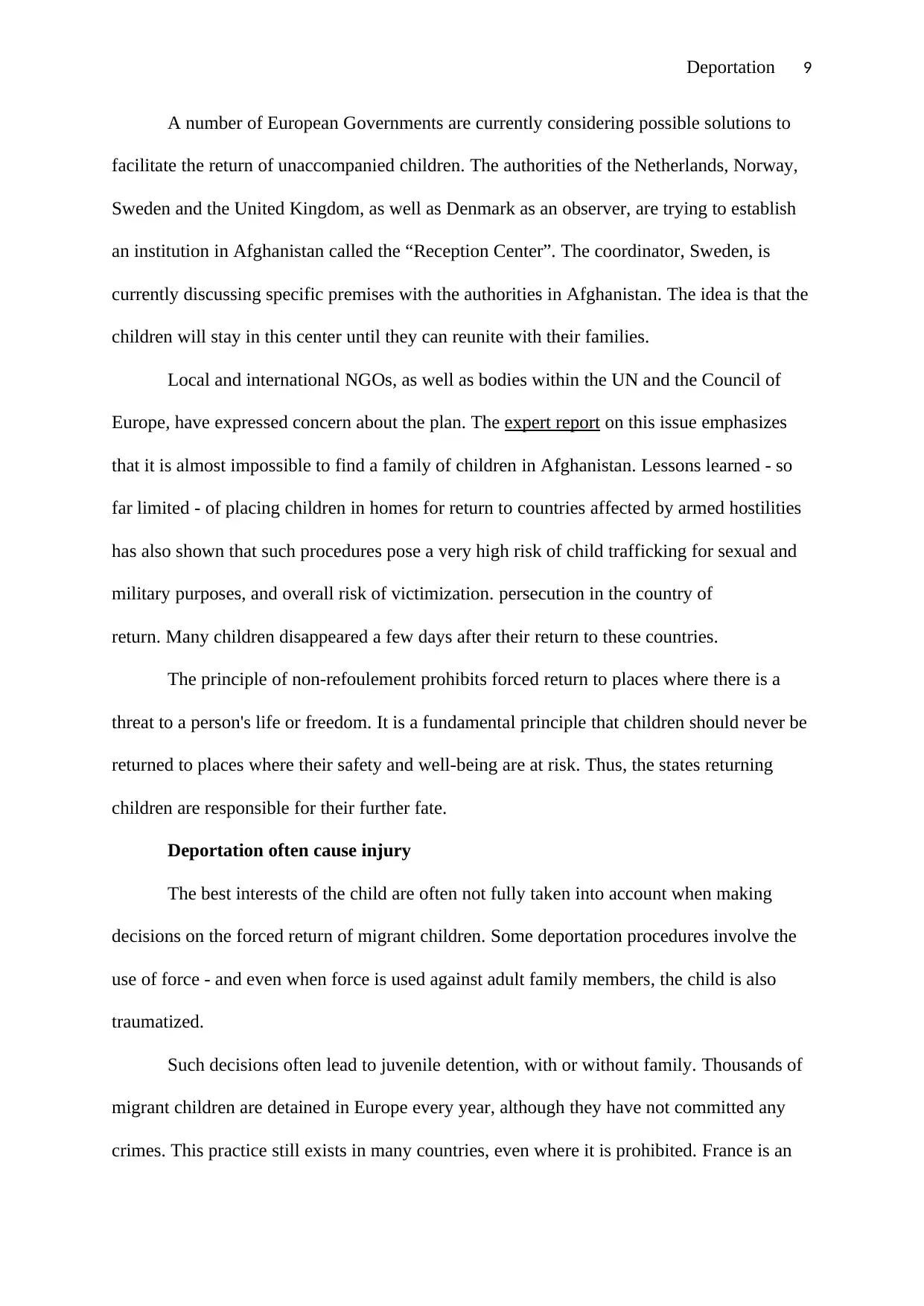
Deportation 9
A number of European Governments are currently considering possible solutions to
facilitate the return of unaccompanied children. The authorities of the Netherlands, Norway,
Sweden and the United Kingdom, as well as Denmark as an observer, are trying to establish
an institution in Afghanistan called the “Reception Center”. The coordinator, Sweden, is
currently discussing specific premises with the authorities in Afghanistan. The idea is that the
children will stay in this center until they can reunite with their families.
Local and international NGOs, as well as bodies within the UN and the Council of
Europe, have expressed concern about the plan. The expert report on this issue emphasizes
that it is almost impossible to find a family of children in Afghanistan. Lessons learned - so
far limited - of placing children in homes for return to countries affected by armed hostilities
has also shown that such procedures pose a very high risk of child trafficking for sexual and
military purposes, and overall risk of victimization. persecution in the country of
return. Many children disappeared a few days after their return to these countries.
The principle of non-refoulement prohibits forced return to places where there is a
threat to a person's life or freedom. It is a fundamental principle that children should never be
returned to places where their safety and well-being are at risk. Thus, the states returning
children are responsible for their further fate.
Deportation often cause injury
The best interests of the child are often not fully taken into account when making
decisions on the forced return of migrant children. Some deportation procedures involve the
use of force - and even when force is used against adult family members, the child is also
traumatized.
Such decisions often lead to juvenile detention, with or without family. Thousands of
migrant children are detained in Europe every year, although they have not committed any
crimes. This practice still exists in many countries, even where it is prohibited. France is an
A number of European Governments are currently considering possible solutions to
facilitate the return of unaccompanied children. The authorities of the Netherlands, Norway,
Sweden and the United Kingdom, as well as Denmark as an observer, are trying to establish
an institution in Afghanistan called the “Reception Center”. The coordinator, Sweden, is
currently discussing specific premises with the authorities in Afghanistan. The idea is that the
children will stay in this center until they can reunite with their families.
Local and international NGOs, as well as bodies within the UN and the Council of
Europe, have expressed concern about the plan. The expert report on this issue emphasizes
that it is almost impossible to find a family of children in Afghanistan. Lessons learned - so
far limited - of placing children in homes for return to countries affected by armed hostilities
has also shown that such procedures pose a very high risk of child trafficking for sexual and
military purposes, and overall risk of victimization. persecution in the country of
return. Many children disappeared a few days after their return to these countries.
The principle of non-refoulement prohibits forced return to places where there is a
threat to a person's life or freedom. It is a fundamental principle that children should never be
returned to places where their safety and well-being are at risk. Thus, the states returning
children are responsible for their further fate.
Deportation often cause injury
The best interests of the child are often not fully taken into account when making
decisions on the forced return of migrant children. Some deportation procedures involve the
use of force - and even when force is used against adult family members, the child is also
traumatized.
Such decisions often lead to juvenile detention, with or without family. Thousands of
migrant children are detained in Europe every year, although they have not committed any
crimes. This practice still exists in many countries, even where it is prohibited. France is an
⊘ This is a preview!⊘
Do you want full access?
Subscribe today to unlock all pages.

Trusted by 1+ million students worldwide
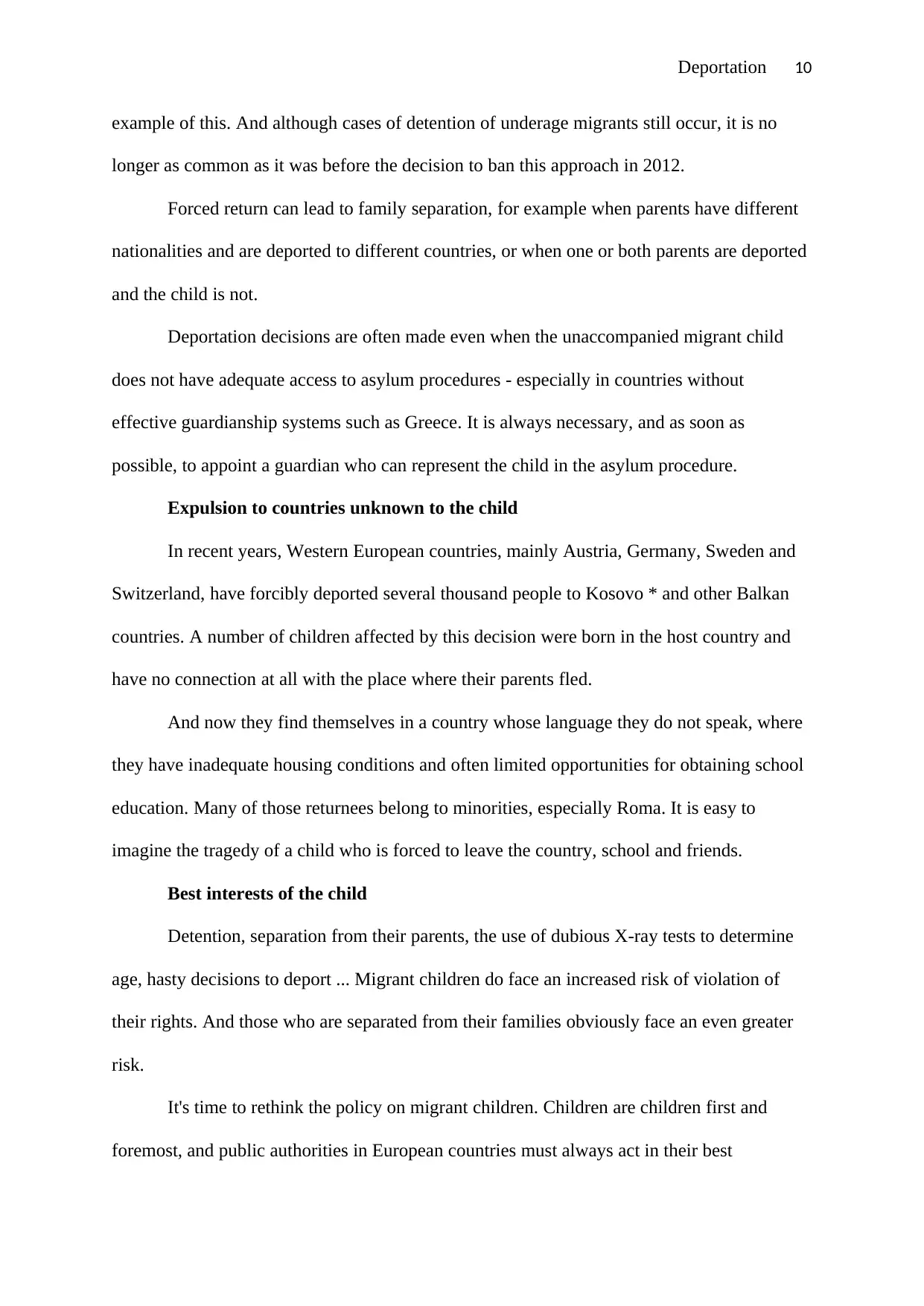
Deportation 10
example of this. And although cases of detention of underage migrants still occur, it is no
longer as common as it was before the decision to ban this approach in 2012.
Forced return can lead to family separation, for example when parents have different
nationalities and are deported to different countries, or when one or both parents are deported
and the child is not.
Deportation decisions are often made even when the unaccompanied migrant child
does not have adequate access to asylum procedures - especially in countries without
effective guardianship systems such as Greece. It is always necessary, and as soon as
possible, to appoint a guardian who can represent the child in the asylum procedure.
Expulsion to countries unknown to the child
In recent years, Western European countries, mainly Austria, Germany, Sweden and
Switzerland, have forcibly deported several thousand people to Kosovo * and other Balkan
countries. A number of children affected by this decision were born in the host country and
have no connection at all with the place where their parents fled.
And now they find themselves in a country whose language they do not speak, where
they have inadequate housing conditions and often limited opportunities for obtaining school
education. Many of those returnees belong to minorities, especially Roma. It is easy to
imagine the tragedy of a child who is forced to leave the country, school and friends.
Best interests of the child
Detention, separation from their parents, the use of dubious X-ray tests to determine
age, hasty decisions to deport ... Migrant children do face an increased risk of violation of
their rights. And those who are separated from their families obviously face an even greater
risk.
It's time to rethink the policy on migrant children. Children are children first and
foremost, and public authorities in European countries must always act in their best
example of this. And although cases of detention of underage migrants still occur, it is no
longer as common as it was before the decision to ban this approach in 2012.
Forced return can lead to family separation, for example when parents have different
nationalities and are deported to different countries, or when one or both parents are deported
and the child is not.
Deportation decisions are often made even when the unaccompanied migrant child
does not have adequate access to asylum procedures - especially in countries without
effective guardianship systems such as Greece. It is always necessary, and as soon as
possible, to appoint a guardian who can represent the child in the asylum procedure.
Expulsion to countries unknown to the child
In recent years, Western European countries, mainly Austria, Germany, Sweden and
Switzerland, have forcibly deported several thousand people to Kosovo * and other Balkan
countries. A number of children affected by this decision were born in the host country and
have no connection at all with the place where their parents fled.
And now they find themselves in a country whose language they do not speak, where
they have inadequate housing conditions and often limited opportunities for obtaining school
education. Many of those returnees belong to minorities, especially Roma. It is easy to
imagine the tragedy of a child who is forced to leave the country, school and friends.
Best interests of the child
Detention, separation from their parents, the use of dubious X-ray tests to determine
age, hasty decisions to deport ... Migrant children do face an increased risk of violation of
their rights. And those who are separated from their families obviously face an even greater
risk.
It's time to rethink the policy on migrant children. Children are children first and
foremost, and public authorities in European countries must always act in their best
Paraphrase This Document
Need a fresh take? Get an instant paraphrase of this document with our AI Paraphraser
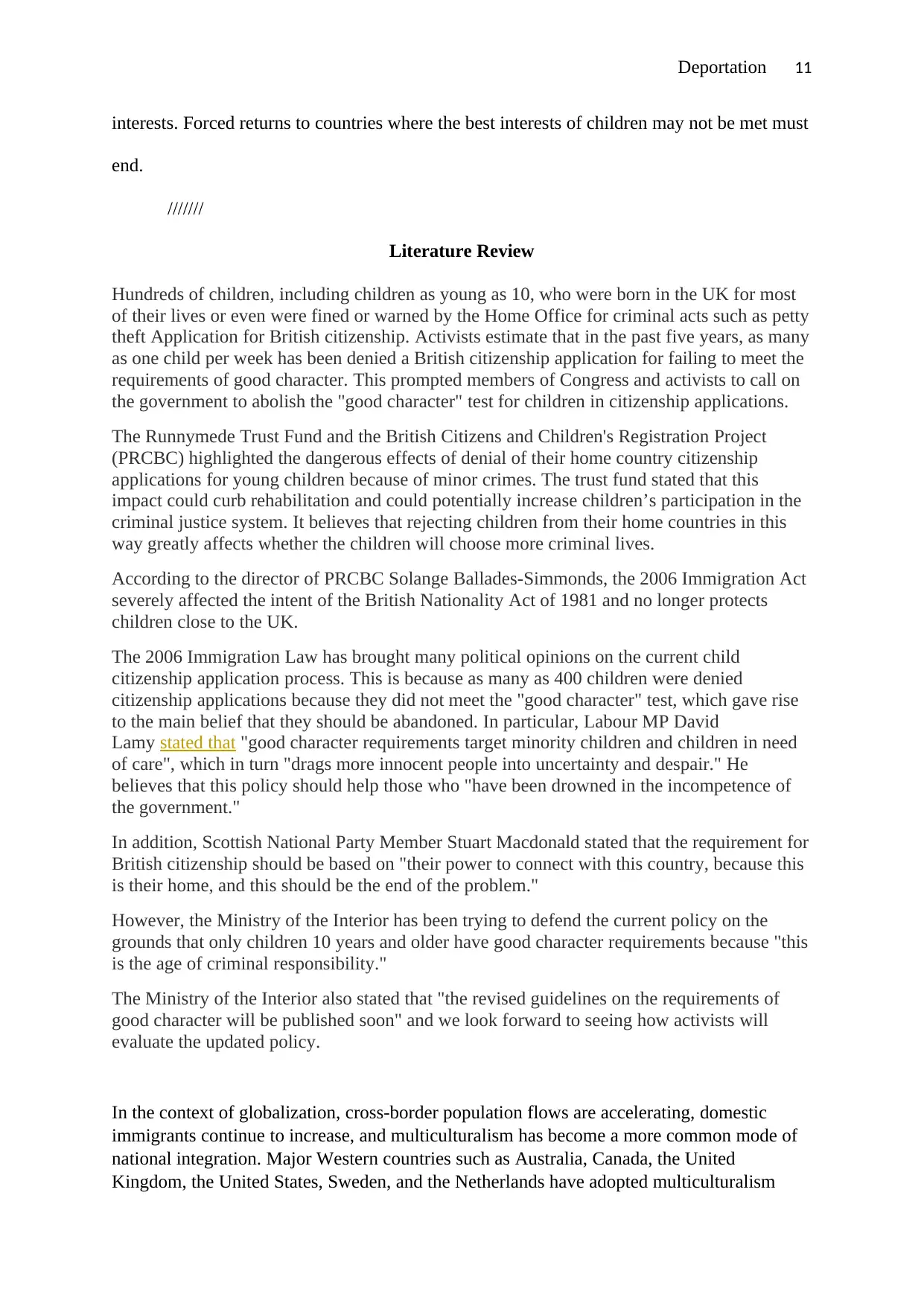
Deportation 11
interests. Forced returns to countries where the best interests of children may not be met must
end.
///////
Literature Review
Hundreds of children, including children as young as 10, who were born in the UK for most
of their lives or even were fined or warned by the Home Office for criminal acts such as petty
theft Application for British citizenship. Activists estimate that in the past five years, as many
as one child per week has been denied a British citizenship application for failing to meet the
requirements of good character. This prompted members of Congress and activists to call on
the government to abolish the "good character" test for children in citizenship applications.
The Runnymede Trust Fund and the British Citizens and Children's Registration Project
(PRCBC) highlighted the dangerous effects of denial of their home country citizenship
applications for young children because of minor crimes. The trust fund stated that this
impact could curb rehabilitation and could potentially increase children’s participation in the
criminal justice system. It believes that rejecting children from their home countries in this
way greatly affects whether the children will choose more criminal lives.
According to the director of PRCBC Solange Ballades-Simmonds, the 2006 Immigration Act
severely affected the intent of the British Nationality Act of 1981 and no longer protects
children close to the UK.
The 2006 Immigration Law has brought many political opinions on the current child
citizenship application process. This is because as many as 400 children were denied
citizenship applications because they did not meet the "good character" test, which gave rise
to the main belief that they should be abandoned. In particular, Labour MP David
Lamy stated that "good character requirements target minority children and children in need
of care", which in turn "drags more innocent people into uncertainty and despair." He
believes that this policy should help those who "have been drowned in the incompetence of
the government."
In addition, Scottish National Party Member Stuart Macdonald stated that the requirement for
British citizenship should be based on "their power to connect with this country, because this
is their home, and this should be the end of the problem."
However, the Ministry of the Interior has been trying to defend the current policy on the
grounds that only children 10 years and older have good character requirements because "this
is the age of criminal responsibility."
The Ministry of the Interior also stated that "the revised guidelines on the requirements of
good character will be published soon" and we look forward to seeing how activists will
evaluate the updated policy.
In the context of globalization, cross-border population flows are accelerating, domestic
immigrants continue to increase, and multiculturalism has become a more common mode of
national integration. Major Western countries such as Australia, Canada, the United
Kingdom, the United States, Sweden, and the Netherlands have adopted multiculturalism
interests. Forced returns to countries where the best interests of children may not be met must
end.
///////
Literature Review
Hundreds of children, including children as young as 10, who were born in the UK for most
of their lives or even were fined or warned by the Home Office for criminal acts such as petty
theft Application for British citizenship. Activists estimate that in the past five years, as many
as one child per week has been denied a British citizenship application for failing to meet the
requirements of good character. This prompted members of Congress and activists to call on
the government to abolish the "good character" test for children in citizenship applications.
The Runnymede Trust Fund and the British Citizens and Children's Registration Project
(PRCBC) highlighted the dangerous effects of denial of their home country citizenship
applications for young children because of minor crimes. The trust fund stated that this
impact could curb rehabilitation and could potentially increase children’s participation in the
criminal justice system. It believes that rejecting children from their home countries in this
way greatly affects whether the children will choose more criminal lives.
According to the director of PRCBC Solange Ballades-Simmonds, the 2006 Immigration Act
severely affected the intent of the British Nationality Act of 1981 and no longer protects
children close to the UK.
The 2006 Immigration Law has brought many political opinions on the current child
citizenship application process. This is because as many as 400 children were denied
citizenship applications because they did not meet the "good character" test, which gave rise
to the main belief that they should be abandoned. In particular, Labour MP David
Lamy stated that "good character requirements target minority children and children in need
of care", which in turn "drags more innocent people into uncertainty and despair." He
believes that this policy should help those who "have been drowned in the incompetence of
the government."
In addition, Scottish National Party Member Stuart Macdonald stated that the requirement for
British citizenship should be based on "their power to connect with this country, because this
is their home, and this should be the end of the problem."
However, the Ministry of the Interior has been trying to defend the current policy on the
grounds that only children 10 years and older have good character requirements because "this
is the age of criminal responsibility."
The Ministry of the Interior also stated that "the revised guidelines on the requirements of
good character will be published soon" and we look forward to seeing how activists will
evaluate the updated policy.
In the context of globalization, cross-border population flows are accelerating, domestic
immigrants continue to increase, and multiculturalism has become a more common mode of
national integration. Major Western countries such as Australia, Canada, the United
Kingdom, the United States, Sweden, and the Netherlands have adopted multiculturalism
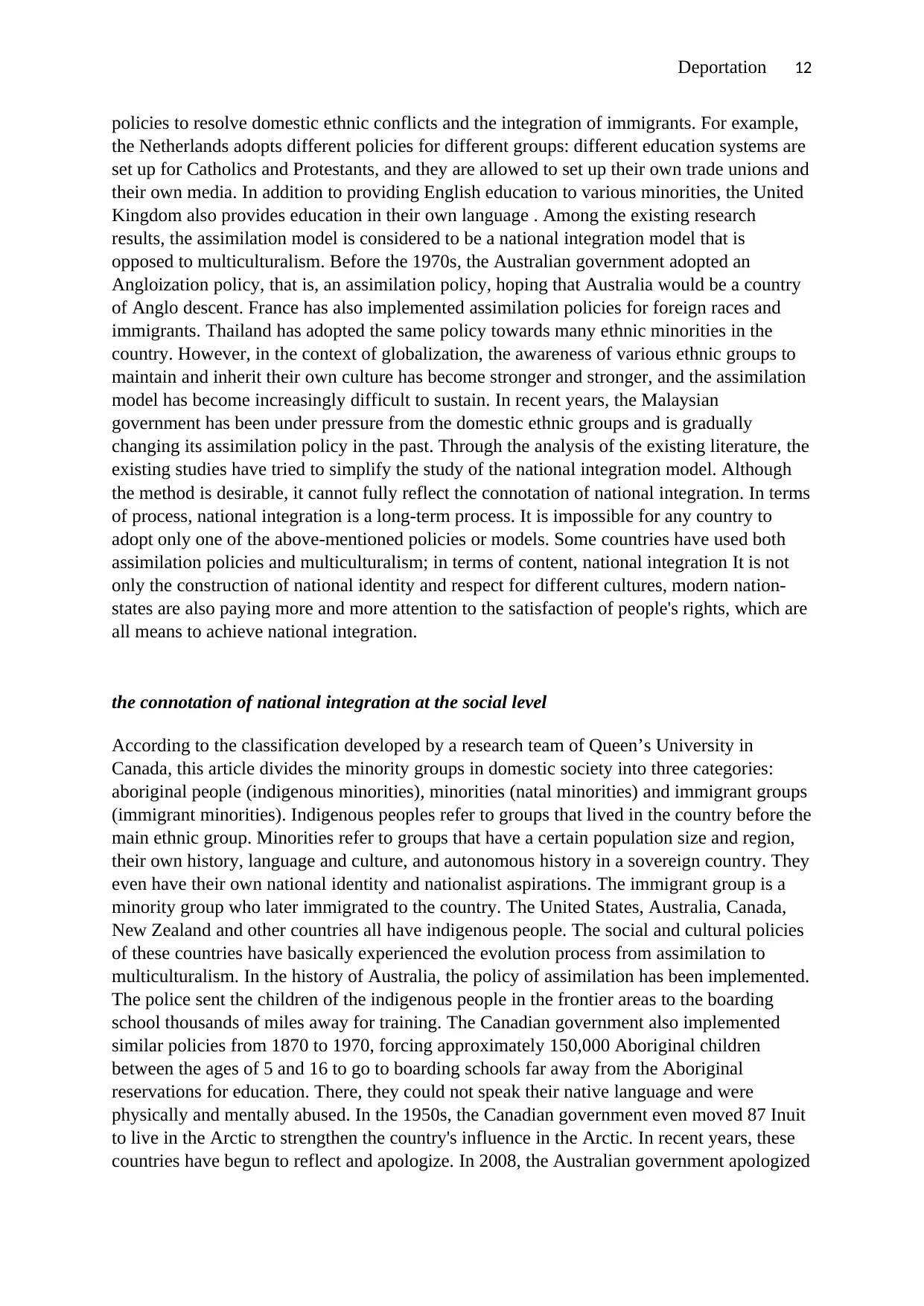
Deportation 12
policies to resolve domestic ethnic conflicts and the integration of immigrants. For example,
the Netherlands adopts different policies for different groups: different education systems are
set up for Catholics and Protestants, and they are allowed to set up their own trade unions and
their own media. In addition to providing English education to various minorities, the United
Kingdom also provides education in their own language . Among the existing research
results, the assimilation model is considered to be a national integration model that is
opposed to multiculturalism. Before the 1970s, the Australian government adopted an
Angloization policy, that is, an assimilation policy, hoping that Australia would be a country
of Anglo descent. France has also implemented assimilation policies for foreign races and
immigrants. Thailand has adopted the same policy towards many ethnic minorities in the
country. However, in the context of globalization, the awareness of various ethnic groups to
maintain and inherit their own culture has become stronger and stronger, and the assimilation
model has become increasingly difficult to sustain. In recent years, the Malaysian
government has been under pressure from the domestic ethnic groups and is gradually
changing its assimilation policy in the past. Through the analysis of the existing literature, the
existing studies have tried to simplify the study of the national integration model. Although
the method is desirable, it cannot fully reflect the connotation of national integration. In terms
of process, national integration is a long-term process. It is impossible for any country to
adopt only one of the above-mentioned policies or models. Some countries have used both
assimilation policies and multiculturalism; in terms of content, national integration It is not
only the construction of national identity and respect for different cultures, modern nation-
states are also paying more and more attention to the satisfaction of people's rights, which are
all means to achieve national integration.
the connotation of national integration at the social level
According to the classification developed by a research team of Queen’s University in
Canada, this article divides the minority groups in domestic society into three categories:
aboriginal people (indigenous minorities), minorities (natal minorities) and immigrant groups
(immigrant minorities). Indigenous peoples refer to groups that lived in the country before the
main ethnic group. Minorities refer to groups that have a certain population size and region,
their own history, language and culture, and autonomous history in a sovereign country. They
even have their own national identity and nationalist aspirations. The immigrant group is a
minority group who later immigrated to the country. The United States, Australia, Canada,
New Zealand and other countries all have indigenous people. The social and cultural policies
of these countries have basically experienced the evolution process from assimilation to
multiculturalism. In the history of Australia, the policy of assimilation has been implemented.
The police sent the children of the indigenous people in the frontier areas to the boarding
school thousands of miles away for training. The Canadian government also implemented
similar policies from 1870 to 1970, forcing approximately 150,000 Aboriginal children
between the ages of 5 and 16 to go to boarding schools far away from the Aboriginal
reservations for education. There, they could not speak their native language and were
physically and mentally abused. In the 1950s, the Canadian government even moved 87 Inuit
to live in the Arctic to strengthen the country's influence in the Arctic. In recent years, these
countries have begun to reflect and apologize. In 2008, the Australian government apologized
policies to resolve domestic ethnic conflicts and the integration of immigrants. For example,
the Netherlands adopts different policies for different groups: different education systems are
set up for Catholics and Protestants, and they are allowed to set up their own trade unions and
their own media. In addition to providing English education to various minorities, the United
Kingdom also provides education in their own language . Among the existing research
results, the assimilation model is considered to be a national integration model that is
opposed to multiculturalism. Before the 1970s, the Australian government adopted an
Angloization policy, that is, an assimilation policy, hoping that Australia would be a country
of Anglo descent. France has also implemented assimilation policies for foreign races and
immigrants. Thailand has adopted the same policy towards many ethnic minorities in the
country. However, in the context of globalization, the awareness of various ethnic groups to
maintain and inherit their own culture has become stronger and stronger, and the assimilation
model has become increasingly difficult to sustain. In recent years, the Malaysian
government has been under pressure from the domestic ethnic groups and is gradually
changing its assimilation policy in the past. Through the analysis of the existing literature, the
existing studies have tried to simplify the study of the national integration model. Although
the method is desirable, it cannot fully reflect the connotation of national integration. In terms
of process, national integration is a long-term process. It is impossible for any country to
adopt only one of the above-mentioned policies or models. Some countries have used both
assimilation policies and multiculturalism; in terms of content, national integration It is not
only the construction of national identity and respect for different cultures, modern nation-
states are also paying more and more attention to the satisfaction of people's rights, which are
all means to achieve national integration.
the connotation of national integration at the social level
According to the classification developed by a research team of Queen’s University in
Canada, this article divides the minority groups in domestic society into three categories:
aboriginal people (indigenous minorities), minorities (natal minorities) and immigrant groups
(immigrant minorities). Indigenous peoples refer to groups that lived in the country before the
main ethnic group. Minorities refer to groups that have a certain population size and region,
their own history, language and culture, and autonomous history in a sovereign country. They
even have their own national identity and nationalist aspirations. The immigrant group is a
minority group who later immigrated to the country. The United States, Australia, Canada,
New Zealand and other countries all have indigenous people. The social and cultural policies
of these countries have basically experienced the evolution process from assimilation to
multiculturalism. In the history of Australia, the policy of assimilation has been implemented.
The police sent the children of the indigenous people in the frontier areas to the boarding
school thousands of miles away for training. The Canadian government also implemented
similar policies from 1870 to 1970, forcing approximately 150,000 Aboriginal children
between the ages of 5 and 16 to go to boarding schools far away from the Aboriginal
reservations for education. There, they could not speak their native language and were
physically and mentally abused. In the 1950s, the Canadian government even moved 87 Inuit
to live in the Arctic to strengthen the country's influence in the Arctic. In recent years, these
countries have begun to reflect and apologize. In 2008, the Australian government apologized
⊘ This is a preview!⊘
Do you want full access?
Subscribe today to unlock all pages.

Trusted by 1+ million students worldwide
1 out of 23
Your All-in-One AI-Powered Toolkit for Academic Success.
+13062052269
info@desklib.com
Available 24*7 on WhatsApp / Email
![[object Object]](/_next/static/media/star-bottom.7253800d.svg)
Unlock your academic potential
Copyright © 2020–2026 A2Z Services. All Rights Reserved. Developed and managed by ZUCOL.